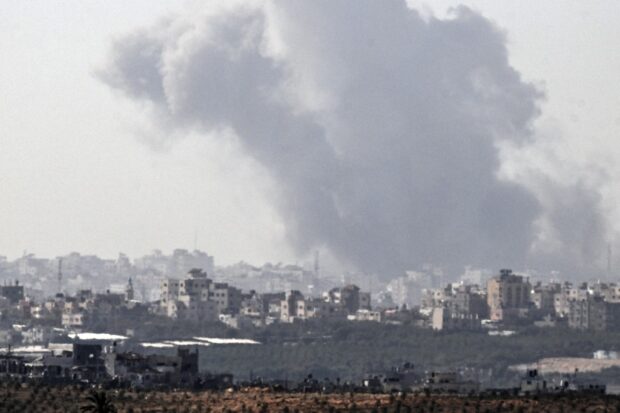Israel conflict from the perspective of a Palestinian human-rights advocate

MANILA, Philippines — The violence in Gaza did not begin on October 7. This is what John (not his real name for security reasons), a human rights advocate from Palestine, wanted to make clear.
On October 7, the militant group Hamas struck Gaza, leaving a total of around 1,400 Israelis dead. While Israel has reiterated that its war is only with Hamas, its bombardment in the weeks after took the lives of at least 9,000 Palestinian civilians—and counting. Despite the violence against Palestinians, John begins his speech with an apology.
READ: Explainer: What’s the Israel-Palestinian conflict about and how did it start?
“First of all, let me really express our principle of sorry, rejecting any attack or any actions that attack civilians, regardless to their nationality or ethnicity. This is not acceptable,” said John during the “Voices from Asia on the Crisis in Palestine” forum.
But the violence, had spanned decades, explained John.
READ: Palestine was a paradise
“Everybody is speaking the seventh of October, the seventh of October. As if everything was good and peaceful and great before that,” said John.
According to John, internal displacement had ravaged Palestinians for decades as a result of oppressive Israeli policies. He added that around 700,000 Palestinians have been displaced because of Israel, a claim further strengthened by Amnesty International.
“They have virtually no prospect of being allowed to return to their homes – many of which have been destroyed – or the villages and cities from where they come. Israel has never recognized their rights,” said Amnesty International on its website.
More than this, Israel has had control over water, fuel, and the supply of goods into Gaza for decades. In retaliation for the Hamas attack, it had recently cut off access to water and fuel completely.
READ: Water shortage at Gaza UN shelters, fears grow amid Israeli offensive
“The killing, the destroying, the destruction of Palestinian homes, controlling land, taking over land, building settlements has been going on for tens of years, for decades, so the problem didn’t really start on the seventh of October. I mean, what happened on the seventh of October, was a result of all these policies,” said John.
John lamented the resounding silence of the world, primarily of powerful Western nations, who did not hesitate to extend their support to Ukraine when Russia invaded its borders.
“We have been under Israeli occupation for 56 years, even 75 years. We haven’t seen any of the support of the Europeans or the Americans, so to conclude, the European and the West are doing all that in violation of the international law,” John said.
“They are really committing genocide against our people,” he said.
Speaking to Asian human rights advocates, he asked the audience to put pressure on the Israeli government to cease the war.
“It’s very important that you raise your voice, you put pressure on your government, to put pressure on Israel, to stop the war. Stopping the war is the main, important issue for us as Palestinians,” said John.
Corazon Fabros, the Filipino co-President of the International Peace Bureau, reiterated John’s sentiment, saying that the Philippine government must call for a ceasefire. She said that the Philippines is a signatory to most United Nations agreements on peace.
Therefore, Fabros lamented the Philippines’ decision to abstain from a United Nations resolution calling for a ceasefire between Hamas and Israel.
READ: DFA explains PH abstention in UN vote on Gaza
“The [Philippine government should] call for ceasefire and the opening and faster process for humanitarian corridors to allow food, medicine supplies as most of the nations of the world has done! Is our government so callous that it cannot even take a position to stop the killings and other forms of violence?” Fabros told INQUIRER.net.
READ: More than 9,000 killed in Hamas-run Gaza, says health ministry
According to the Department of Foreign Affairs (DFA), the Philippines would have voted yes to the resolution had it included a condemnation of the October 7 Hamas attack.
READ: Israel envoy worries Filipino protesters lack awareness on Israel-Hamas war
But Fabros believed that a ceasefire was necessary to keep Filipinos in the Middle East safe, as tensions may escalate and spread to neighboring countries.
“Filipinos should lobby our government to make a call for a ceasefire as this is the way to keep Filipinos in the warzone out of harm’s way. Not only Filipinos but everyone in the area. Only with a ceasefire, a stop to violence will create the atmosphere for diplomatic, peace negotiations, to prevent escalation of the war,” said Fabros.